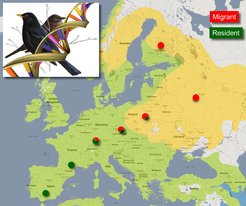Ecological and genomic control of migration

Abstract Animal migration is a fundamental and ubiquitous feature of many animals. However, our knowledge about the underlying mechanisms, which generate the decision to migrate or not, or when and where to go, is still limited. We would like to welcome students who are interested to study the ecological and genomic control of migration in the partially migratory Eurasian blackbird (Turdus merula) using state of the art field tracking techniques and genomic approaches (e.g. comparative transcriptomics). Across its breeding range the Eurasian blackbird, like many other species, consists of populations which exhibit different overwintering strategies ranging from completely sedentary (e.g. Spain, France), partially migratory (e.g. Germany, Czech Republic, Poland) to mainly completely migratory (e.g. Finland, Russia). We will use this phenotypic variation within and among populations across the entire breeding range of this species to elucidate the genomic and ecological players of individual migration strategies. This PhD-project will be co-advised by the Max-Planck-Institute for Ornithology in Radolfzell and the Genomics Center Konstanz.
Keyword Alternative phenotypes, climate change, GPS logger, eco-evolutionary dynamics, gene expression, molecular genetics.
Main advisers Jesko Partecke, MPIO Radolfzell and Axel Meyer, University Konstanz
